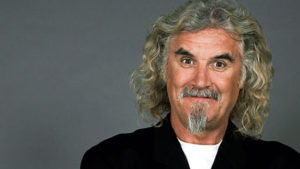 When Billy Connolly bought his first banjo in Glasgow’s famous Barrowland market his ambition was to become a folk singer. He achieved that ambition within a relatively short time and couldn’t have predicted that it would lead to him achieving world-wide fame as a comedian, going on to star in films such as Mrs Brown with Dame Judi Dench, having three giant murals commissioned in his honour by his home town and winning honours including a knighthood and a BAFTA Lifetime Achievement award. Connolly’s comic talent was nurtured by the Scottish folk scene. Having been turned onto the banjo through hearing Flatt & Scruggs’ theme song to the Beverley Hillbillies and having warmed to Pete Seeger’s banjo accompanied singing of Bob Dylan’s A Hard Rain’s a-Gonna Fall, Connolly determined that he was going to follow suit.
When Billy Connolly bought his first banjo in Glasgow’s famous Barrowland market his ambition was to become a folk singer. He achieved that ambition within a relatively short time and couldn’t have predicted that it would lead to him achieving world-wide fame as a comedian, going on to star in films such as Mrs Brown with Dame Judi Dench, having three giant murals commissioned in his honour by his home town and winning honours including a knighthood and a BAFTA Lifetime Achievement award. Connolly’s comic talent was nurtured by the Scottish folk scene. Having been turned onto the banjo through hearing Flatt & Scruggs’ theme song to the Beverley Hillbillies and having warmed to Pete Seeger’s banjo accompanied singing of Bob Dylan’s A Hard Rain’s a-Gonna Fall, Connolly determined that he was going to follow suit.
In 1964 he fell in with singer, guitarist and wit Danny Kyle, who introduced Connolly to folk pubs including the Scotia Bar in Glasgow and the Glasgow Folk Club in Montrose Street, and the following year, Connolly and singer-guitarist Tam Harvey formed the Humblebums.
They arrived at a good time because the Transatlantic label was releasing albums by fellow Glaswegians Hamish Imlach and Bert Jansch and the proprietor, Nat Joseph, leant a sympathetic ear to their songs, singing and picking. The first Humblebums album, First Collection of Merry Melodies was released in February 1969. Shortly afterwards Connolly met an accomplished songwriter, singer and guitarist, Gerry Rafferty and after initially working as a trio with Harvey, they became the New Humblebums, releasing the album of that name in September 1969.
Connolly and Rafferty were polar opposites. Their concerts alternated between Rafferty’s sensitive, beautifully written songs and Connolly’s anarchic humour and a third Humblebums album, Open up the Door, foretold Rafferty’s future as a hugely successful singer-songwriter much more than it indicated where Connolly might be heading. They went their separate ways in 1971, with Connolly hitting the folk club circuit and releasing Billy Connolly Live on Transatlantic the following year.
By this time Connolly’s talent for parody had resulted in a theme song, The Welly Boot Song, a skit on the popular folk song The Wark o’ the Weavers, and his song introductions had developed into lengthy, hilarious monologues. Nat Joseph encouraged him to keep working on his comedy and in 1974, Transatlantic released a live double album, Solo Concert that would take Connolly to an audience way beyond the folk scene. He had already made his theatrical debut, with the revue Connolly’s Glasgow Flourish in Cumbernauld, and had co-written and appeared in The Great Northern Welly Boot Show on the Edinburgh Fringe, and his immaculately timed and brilliantly observed stories such as The Last Supper made Solo Concert a huge seller.
After Connolly appeared on BBC TV’s Michael Parkinson Show in 1975, flooring the host with his joke about the man who buried his wife “posterior up” so he could park his bike, he may have outgrown his folk roots but he never entirely left them behind. The parodic songwriting style he developed in the folk clubs would emerge in pop hits including D.I.V.O.R.C.E. and In the Brownies. His folk singing years gave him much stand-up material and his popular World Tour of … television films have featured music written and performed by John McCusker and featuring a cast of folk musicians including Connolly himself on banjo and autoharp, making Billy Connolly a folk hero in every sense.